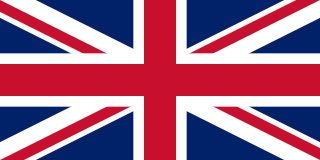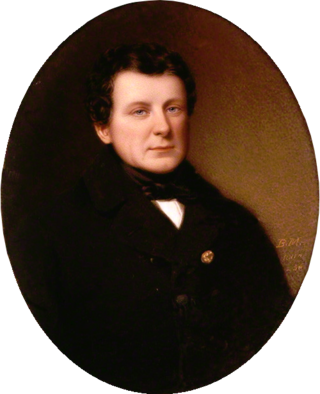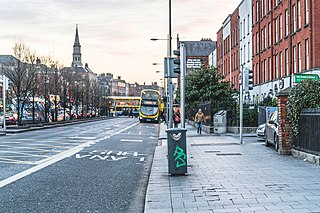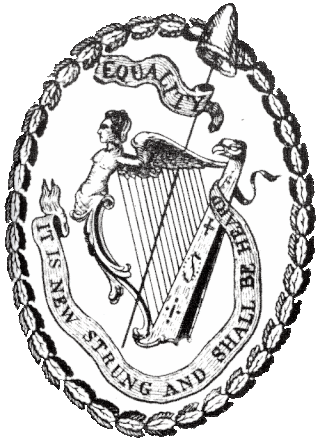Related Research Articles
Henry Grattan was an Irish politician and lawyer who campaigned for legislative freedom for the Irish Parliament in the late 18th century from Britain. He was a Member of the Irish Parliament (MP) from 1775 to 1801 and a Member of Parliament (MP) in Westminster from 1805 to 1820. He has been described as a superb orator and a romantic. With generous enthusiasm he demanded that Ireland should be granted its rightful status, that of an independent nation, though he always insisted that Ireland would remain linked to Great Britain by a common crown and by sharing a common political tradition.

The United Kingdom of Great Britain and Ireland was a sovereign state in Northwestern Europe that was established by the union in 1801 of the Kingdom of Great Britain and the Kingdom of Ireland. The establishment of the Irish Free State in 1922 led to the remainder later being renamed the United Kingdom of Great Britain and Northern Ireland in 1927.

Daniel O'Connell (I) (Irish: Dónall Ó Conaill; 6 August 1775 – 15 May 1847), hailed in his time as The Liberator, was the acknowledged political leader of Ireland's Roman Catholic majority in the first half of the 19th century. His mobilisation of Catholic Ireland, down to the poorest class of tenant farmers, secured the final instalment of Catholic emancipation in 1829 and allowed him to take a seat in the United Kingdom Parliament to which he had been twice elected.

James Napper Tandy, known as Napper Tandy, was an Irish revolutionary and a founder of the United Irishmen. He experienced exile, first in the United States and then in France, for his role in attempting to advance a republican insurrection in Ireland with French assistance.

Dorset Street is an important thoroughfare on the northside of Dublin, Ireland, and was originally part of the Slighe Midh-Luchra, Dublin's ancient road to the north that begins where the original bridging point at Church Street is today. Subsequently, yet prior to the street being given its current name in the 18th century, the road was known as Drumcondra Lane and was shown on maps as such. It is divided into Dorset Street Lower and Dorset Street Upper.

The Society of United Irishmen was a sworn association in the Kingdom of Ireland formed in the wake of the French Revolution to secure "an equal representation of all the people" in a national government. Despairing of constitutional reform, and in defiance both of British Crown forces and of Irish sectarian division, in 1798 the United Irishmen instigated a republican rebellion. Their suppression was a prelude to the abolition of the Irish Parliament in Dublin and to Ireland's incorporation in a United Kingdom with Great Britain. An attempt, following the Acts of Union, to revive the movement and renew the insurrection led to an abortive rising in Dublin in 1803.
Catholic emancipation or Catholic relief was a process in the kingdoms of Great Britain and Ireland, and later the combined United Kingdom in the late 18th century and early 19th century, that involved reducing and removing many of the restrictions on Roman Catholics introduced by the Act of Uniformity, the Test Acts and the penal laws. Requirements to abjure (renounce) the temporal and spiritual authority of the pope and transubstantiation placed major burdens on Roman Catholics.

The Roman Catholic Relief Act 1829, also known as the Catholic Emancipation Act 1829, removed the sacramental tests that barred Roman Catholics in the United Kingdom from Parliament and from higher offices of the judiciary and state. It was the culmination of a fifty-year process Catholic emancipation which had offered Catholics successive measures of "relief" from the civil and political disabilities imposed by Penal Laws in both Great Britain and in Ireland in the seventeenth, and early eighteenth, centuries.

William Drennan was an Irish physician and writer who moved the formation in Belfast and Dublin of the Society of United Irishmen. He was the author of the Society's original "test" which, in the cause of representative government, committed "Irishmen of every religious persuasion" to a "brotherhood of affection". Drennan had been active in the Irish Volunteer movement and achieved renown with addresses to the public as his "fellow slaves" and to the British Viceroy urging "full and final" Catholic emancipation. After the suppression of the 1798 Rebellion, he sought to advance democratic reform through his continued journalism and through education. With other United Irish veterans, Drennan founded the Belfast [later the Royal Belfast] Academical Institution. As a poet, he is remembered for his eve-of-rebellion When Erin First Rose (1795) with its reference to Ireland as the "Emerald Isle".

The history of Ireland from 1691–1800 was marked by the dominance of the Protestant Ascendancy. These were Anglo-Irish families of the Anglican Church of Ireland, whose English ancestors had settled Ireland in the wake of its conquest by England and colonisation in the Plantations of Ireland, and had taken control of most of the land. Many were absentee landlords based in England, but others lived full-time in Ireland and increasingly identified as Irish.. During this time, Ireland was nominally an autonomous Kingdom with its own Parliament; in actuality it was a client state controlled by the King of Great Britain and supervised by his cabinet in London. The great majority of its population, Roman Catholics, were excluded from power and land ownership under the penal laws. The second-largest group, the Presbyterians in Ulster, owned land and businesses but could not vote and had no political power. The period begins with the defeat of the Catholic Jacobites in the Williamite War in Ireland in 1691 and ends with the Acts of Union 1800, which formally annexed Ireland in a United Kingdom from 1 January 1801 and dissolved the Irish Parliament.
John Leslie Foster, FRS was an Irish barrister, judge and Tory Member of Parliament (MP) in the United Kingdom Parliament. In 1830 he was appointed a Baron of the Court of Exchequer of Ireland.
In Ireland, the penal laws were a series of legal disabilities imposed in the seventeenth, and early eighteenth, centuries on the kingdom's Roman Catholic majority and, to a lesser degree, on Protestant "Dissenters". Enacted by the Irish Parliament, they secured the Protestant Ascendancy by further concentrating property and public office in the hands of those who, as communicants of the established Church of Ireland, subscribed to the Oath of Supremacy. The Oath acknowledged the British monarch as the "supreme governor" of matters both spiritual and temporal, and abjured "all foreign jurisdictions [and] powers"—by implication both the Pope in Rome and the Stuart "Pretender" in the court of the King of France.

John Keogh was an Irish merchant and political activist. He was a leading campaigner for Catholic Emancipation and reform of the Irish Parliament, active in Dublin on the Catholic Committee and, with some reservation, in the Society of United Irishmen.
Oliver Bond was an Irish merchant and a member of the Leinster directorate of the Society of United Irishmen. He died in prison following the Irish Rebellion of 1798.
The Irish Patriot Party was the name of a number of different political groupings in Ireland throughout the 18th century. They were primarily supportive of Whig concepts of personal liberty combined with an Irish identity that rejected full independence, but advocated strong self-government within the British Empire.

William Paulet Carey was an Irish art critic and publicist, known also as an engraver and dealer. In 1792 he joined the Society of United Irishmen in Dublin, but feeling unsupported as he himself faced charges of sedition, in 1794 he testified in the government case against the United Irishman William Drennan. In England, he spent half a century promoting British art, most of his writings being distributed gratuitously.

Arthur Guinness was an Irish brewer, banker, politician and flour miller active in Dublin, Ireland. To avoid confusion with his father, also Arthur Guinness (1725–1803), he is often known as "the second Arthur Guinness" or as Arthur Guinness II or Arthur II Guinness.

The Catholic Committee was a county association in late 18th-century Ireland that campaigned to relieve Catholics of their civil and political disabilities under the kingdom's Protestant Ascendancy. After their organisation of a national Catholic Convention helped secure repeal of most of the remaining Penal Laws in 1793, the Committee dissolved. Members briefly reconvened the following year when a new British Viceroy, William Fitzwilliam, raised hopes of further reform, including lifting the sacramental bar to Catholics entering the Irish Parliament. When these were dashed by his early recall to London, many who had been mobilized by the Committee and by the Convention, defied their bishops, and joined the United Irishmen as they organised for a republican insurrection.

Captain Waddell Cunningham was an Irish merchant, prominent in the commercial and civic life of Georgian-era Belfast. As a patron of the Belfast Charitable Society and its Poor House; as a commander of the Volunteer patriot militia; and as a Presbyterian subscriber to the costs of erecting Belfast's first Catholic chapel, in a town much agitated by the American struggle for independence he was seen a friend of reform. But as a land speculator, a slaveholder in the West Indies, and an opponent of immediate Catholic Emancipation, he was at odds with the more democratic elements of the town and surrounding districts who, in the wake of the French Revolution, were to directly challenge the authority of the British Crown and of the landed Protestant Ascendancy

Robert Tennent (1765–1837) was an Irish physician, merchant and philanthropist in Belfast. Representative of a politically radical Presbyterian current in Ireland, in the years following the Acts of Union he was renowned for his confrontations with the local Tory establishment. Among the numerous civic initiatives with which he was associated, the most lasting proved to be Royal Belfast Academical Institution and what is today the Royal Victoria Hospital, Belfast.